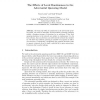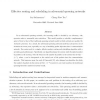280 search results - page 1 / 56 » Adversarial Queueing Model for Continuous Network Dynamics |
MFCS
2005
Springer
15 years 7 months ago
2005
Springer
121
Voted
ESA
2008
Springer
15 years 3 months ago
2008
Springer
Abstract. We study the effect of randomness in the adversarial queueing model. All proofs of instability for deterministic queueing strategies exploit a finespun strategy of insert...
135
click to vote
MST
2011
14 years 9 months ago
2011
In this paper we generalize the Continuous Adversarial Queuing Theory (CAQT) model [5] by considering the possibility that the router clocks in the network are not synchronized. W...
FOCS
2003
IEEE
15 years 7 months ago
2003
IEEE
We study the stability of the commonly used packet forwarding protocol, FIFO (First In First Out), in the adversarial queueing model. We prove that FIFO can become unstable, i.e.,...
143
click to vote
ALGORITHMICA
2005
15 years 2 months ago
2005
In an adversarial queueing network, the incoming traffic is decided by an adversary, who operates under a reasonable rate restriction. This model provides a valuable, complementar...


